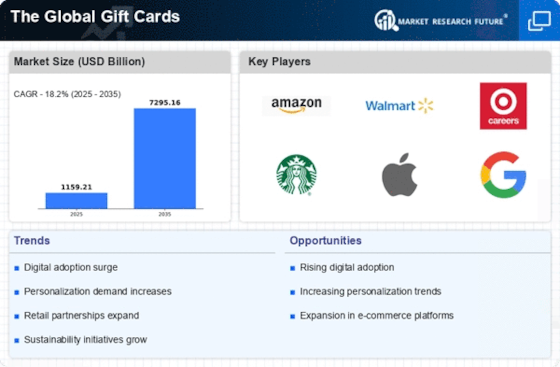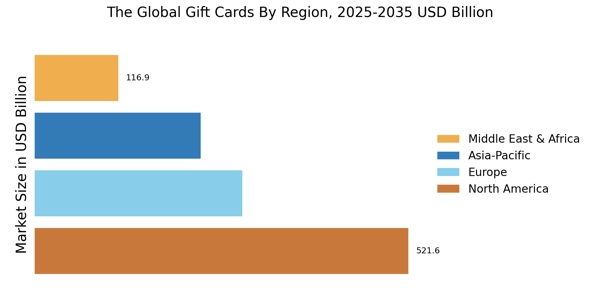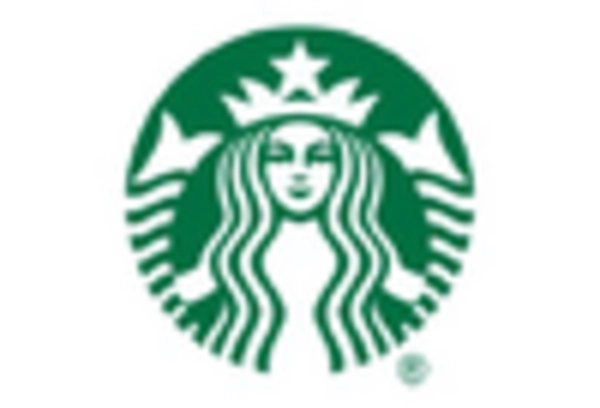Growth of Retail Sector
The expansion of the retail sector plays a crucial role in driving The Global gift cards Industry. As retail sales continue to grow, the demand for gift cards as a popular gifting option is expected to rise correspondingly. Data from various sources indicates that retail sales have shown resilience, with a steady increase in consumer spending across various categories. This growth is particularly evident in sectors such as fashion, electronics, and dining, where gift cards are frequently utilized. Retailers are increasingly promoting gift cards as a versatile gifting solution, which not only enhances customer loyalty but also encourages repeat purchases. The integration of gift cards into loyalty programs further solidifies their position in the market, making them an attractive option for both consumers and retailers alike.
Increasing Adoption of E-Gifting
The rise in digital technology has led to a notable increase in the adoption of e-gifting solutions within The Global Gift Cards Industry. Consumers are increasingly favoring the convenience of purchasing and sending gift cards electronically, which eliminates the need for physical cards. This trend is supported by data indicating that e-gift card sales have surged, with projections suggesting a compound annual growth rate of over 15% in the coming years. The ease of use and instant delivery options appeal to a tech-savvy demographic, particularly millennials and Gen Z, who prioritize speed and efficiency in their shopping experiences. As more retailers and brands offer digital gift cards, the market is likely to expand further, catering to the evolving preferences of consumers.
Increased Focus on Corporate Gifting
The growing emphasis on corporate gifting is emerging as a pivotal driver in The Global Gift Cards Industry. Businesses are increasingly recognizing the value of gift cards as a tool for employee recognition and client appreciation. This trend is supported by data showing that companies are allocating larger budgets for corporate gifting initiatives, with gift cards being favored for their versatility and ease of distribution. Corporate gift cards not only enhance employee morale but also strengthen client relationships, making them a strategic choice for businesses. As organizations continue to prioritize employee engagement and customer satisfaction, the demand for corporate gift cards is expected to rise, further propelling the growth of the market.
Rising Popularity of Experience-Based Gifting
The shift towards experience-based gifting is emerging as a significant driver within The Global Gift Cards Industry. Consumers are increasingly seeking unique and memorable experiences rather than traditional material gifts. This trend is reflected in the growing popularity of gift cards for experiences such as travel, dining, and entertainment. Market data suggests that experience gift cards are gaining traction, with a notable increase in sales as consumers prioritize creating lasting memories. This shift not only caters to the desires of modern consumers but also allows retailers to diversify their offerings. By providing gift cards for experiences, businesses can tap into a lucrative market segment that values personalization and meaningful gifting, thereby enhancing their competitive edge.
Technological Advancements in Payment Solutions
Technological advancements in payment solutions are significantly influencing The Global Gift Cards Industry. The integration of mobile wallets, contactless payments, and blockchain technology is transforming how consumers purchase and redeem gift cards. These innovations enhance the overall user experience, making transactions faster and more secure. Data indicates that mobile payment adoption is on the rise, with a substantial percentage of consumers preferring to use their smartphones for transactions. This trend is likely to drive the demand for digital gift cards, as consumers seek seamless and efficient payment options. Retailers that embrace these technologies can improve customer satisfaction and loyalty, positioning themselves favorably in a competitive market landscape.


















